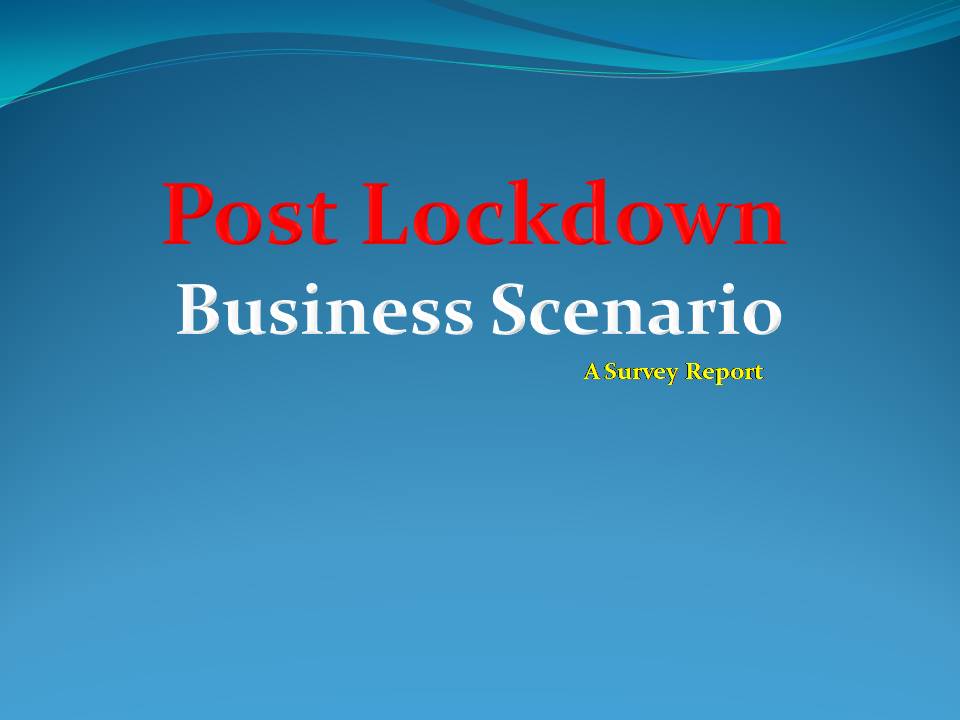Quick Survey on Post Lockdown Business Scenario


PHDCCI Quick Survey on Post Lockdown Business Scenario
Executive Summary
The growing severity of the impact caused by the widespread pandemic COVID-19, on our economy, its people and the Nation as a whole is a matter of deep concern. In India, more than 1.6 lakh people are impacted due to COVID, of which around 4500 people have died and around 68,000 people have recovered so far. The Government has been undertaking proactive and fast track measures to safeguard its people, economy, trade and industry against the wild tide of pandemic COVID-19.
The Government's decision to exit the lockdown in a graded manner by giving equal importance to lives and livelihood of Indian citizens is appreciable. This will go a long way in uplifting the sentiments of the stricken Indian Industry, helping the daily wagers, poor and the needy earn their livelihood and also revive India's economic growth trajectory.
However, COVID-19 induced lockdown in the country has created a difficult time for the industry. Most businesses are facing challenges of sustaining their business activities and keeping their financial wheels turning during the lockdown period due to less or almost no business activities, weak demand scenario and low consumer confidence.
At this backdrop, to assess the impact of pandemic COVID-19 on Indian businesses and their preparedness to face post lockdown issues and challenges, PHD Chamber of Commerce and Industry has conducted a Pan India Survey. A total of 2770 responses were received from diverse sectors, scales of operation and regional locations in the country. Responses on the survey received comprise of 9% responses from startups, 14% from micro-enterprises, 24% from small enterprises, 33% from medium enterprises and 20% from large enterprises.
The Survey responses have been broadly received from businesses involved in 35 major sectors across pan India, clubbed into 4 broad categories, such as manufacturing, services, construction and agriculture. Responses received comprise of 40% from manufacturing/ industry, 32% from services, 11% from agriculture, 7% from construction and the remaining 10% from other categories.
According to the survey findings, majority of the respondents are of the view that maintaining price-cost margins/profitability, payment of wages/ salaries to workers/ Employees, availability of working capital, repayment of loans/payment of EMIs, costs of capital, availability of finances/loans, costs of social distancing, weakening of demand, compliances of labour laws and retaining of the full workforce will be the challenges for businesses in the post lockdown scenario.
Further, majority of the respondents opined that increasing the sales volume, enhancing the competitiveness of business, cut in the costs of business operations, enhancing business operations in the domestic market, focus on innovation, research and development, enhancing the price-cost margin, reducing the workforce in business operations, increasing the scale of business operations, diversify business operations and enhancing business operations in the international market will be the plans of the businesses in the post lockdown scenario.
At this juncture, the announcement of a bold economic relief package of Rs 20 lakh crores for the year 2020, totalling to 10% of India's GDP is highly laudable to mitigate the daunting impact of Pandemic COVID-19 on the economy, trade and Industry through various relief measures and benefits to India's trade and industry. This will not only build confidence in the trade and industry but also refuel the economic growth trajectory and maintain GDP growth at around 4% in the current financial year. This would enable the country to witness a V-shaped recovery in the economic growth trajectory rather than a U-shaped recovery.

It is suggested that the cost of doing business, including the cost of capital, cost of compliances, cost of logistics, cost of land and availability of land, cost of power/ energy and cost of labor, should be reduced in the country to attracts foreign investors and provide a boost to the domestic businesses. Land reforms such as an increase in the lease period and the creation of land banks for the use of industry should be focused upon. The state should have a ready land bank with developed infrastructure so that the project can be started immediately. One window service should be set up to give clearance for all the permissions in 7 days to ensure faster and efficient action and decision-making. India should build domestic capacities to mitigate the impact on import demand and materialize an opportunity to increase its presence in global exports. India should target the companies from US, Japan, EU, that desirous of shifting their base and promote Make in India. This will help the country to become the manufacturing hub of global supply chains and a global export powerhouse in the coming times.
Going ahead, the focus should be on enhancing consumption expenditure, ensuring the provision of hassle-free disbursements of loans vis-Ã -vis enhanced liquidity to the industry, reducing the lending rate by all the banks, supporting MSMEs and Startups through value chains enhancement, increasing working capital requirement of the businesses, among others. These reform measures would go a long way to help trade and industry to resume business activity in this extremely difficult time.
Post Lockdown Challenges for Businesses
According to the survey findings, majority of the respondents are of view that maintaining price-cost margins/profitability (61%), payment of wages/ salaries to workers/ Employees (60%), availability of working capital (58%), repayment of loans/payment of EMIs (53%), costs of capital (52%), availability of finances/loans (51%), costs of social distancing (51%), weakening of demand (51%), compliances of labour laws (50%) and retaining of the full workforce (49%) will be the challenges for businesses in the post lockdown scenario.
1. Maintaining adequate price-cost margins/ profitability
Due to COVID induced lockdown, on one hand, the sales volumes have declined drastically because of the decline in the demand, while on the other hand the prices of raw material have increased or are likely to increase due to supply disruptions. Further, after the lockdown period, businesses will be requiring adequate time to get back to their normalized operations, clear their inventories and generate profit. At this background, the majority of the respondents (61%) have said that maintenance of adequate price-cost margins/ profitability will be highly challenging in the post lockdown scenario.
2. Payment of wages/ salaries to workers/ employees
COVID induced lockdown have stranded business operations, temporarily closed industries & factories with no or low revenue churning. This has resulted in inability of companies to pay full or even partial wages/salaries to their worker/employees. In addition, due to temporary shut-down of the manufacturing facilities, the fixed costs like employee wages & salary, are resulting in spiking the costs of businesses. Majority of the respondents have opined that even after lockdown period, they will be requiring adequate time to get back to their normalized operations and revenue levels. With this backdrop, 60% of respondents have responded that payment of wages/ salaries to workers/ employees will be highly challenging in post lockdown scenario.
3. Availability of working capital
Majority of the respondents (58%) has opined that the availability of working capital will be highly challenging in the post lockdown business scenario. The closure of factories, malls, markets, small businesses, among others have adversely impacted their overall working capital cycle. As there is a drastic fall in the business activities vis-a-vis lower domestic and international sales, the working capital of the businesses have been disrupted. Further, as MSMEs completely depend on the working capital for meeting their short-term expenses, including purchasing raw materials, payment of salaries, meeting overhead expense, among others, the working capital disruption due to COVID has become a major challenge for MSMEs.
4. Repayment of loans/ payment of EMIs

Majority of the respondents (53%) have opined that repayment of loans/ payment of EMIs will be highly challenging in post lockdown scenario. The stranded business operations, temporarily closed industries & factories, no or low revenue churning and the inability of companies to pay full wages/salaries during the lockdown period has severely impacted the ability of businesses and individuals to repay their loans and/ or pay their monthly EMIs. is very important to companies/business which intend to expand/diversify their operations and fund their business, cost of capital will be a major challenge for such businesses. Further, the cost of capital is relatively high in India and this impacts the competitiveness of manufacturers and exporters of India in the international market. With this backdrop, 52% of respondents have responded that cost of capital will be highly challenging in a post lockdown scenario.
6. Availability of finances/ loans
COVID situation has caused a severe liquidity problem in the economy. This may create a likely situation of non-availability of adequate finances/loans in post lockdown scenario. Further, a significant portion of the population and businesses in India have no access to formal finance. Sub-optimal and cash-driven, a majority of Indian MSMEs will be facing the issue of availability of finances or loans in the coming times. Therefore, the majority of the responding business firms (51%) are of view that the availability of finances/ loans will be highly challenging in post lockdown scenario.
7. Costs of social distancing
The outbreak of COVID in the world has forced the counties to stress upon the essential norm of social distancing. Adoption of this norm in daily activities will cause businesses to change their way of working, make huge changes in their office premises and provide a sanitized working environment to their employees. Therefore, majority of the respondents (51%) are of the view that the cost of social distancing will be highly challenging for the businesses in a post lockdown scenario.
8. Weakening of demand
Even before the onset of this pandemic, the global economy was confronting turbulence because of disruptions in trade flows and attenuated growth. The situation has now been aggravated by the demand shock that COVID-19 has inflicted globally. Complete lockdown in India has resulted in the stranded business operations, no or low revenue generation, hit on daily wagers and pay cuts across companies. This has severely impact the overall consumption trend and consumer spending in India, thus weakening the overall demand in the economy. Disruptions in business cycles are bound to impact the demand for commercial as well as residential spaces in the real estate market. Therefore, most of the respondents (51%) have responded that this will have a high challenging on them in post lockdown scenario.
9. Compliances of labour laws
Labour laws in India needs to be made more effective, flexible and in sync with emerging economic and industrial scenario. Most of the respondents have responded that given the disruptions caused by COVID and resultant lock-down, following the relatively rigid provisions in different labour laws prevalent in the Indian economy will become difficult and hamper the revival of the industry. Thus, 50% of respondents opined that compliances of labour laws will be highly challenging in a post lockdown scenario.
10. Retaining of the full workforce
Due to lockdown, the majority of the factories/ businesses/companies are shut with no or little revenue, all export orders are getting cancelled and units unable to repay loans. Majority of the respondents have responded that this will make them less likely to retain of the full workforce. Further, most of the retrenchment is likely to take place in labour-intensive sectors. Thus, 49% of respondents opined that retention of the full workforce will be highly challenging in post lockdown scenario.
operations (50%), increasing the scale of business operations (44%), diversify business operations (43%) and enhancing business operations in the international market (36%) will be the plans of the businesses in the post lockdown scenario.
Source: PHDCCI Quick Survey, May 2020
Post-Lockdown Plans of Businesses
According to the survey findings, majority of the respondents are of view that increasing the sales volume (67%), enhancing the competitiveness of business (65%), cut in the costs of business operations (64%), enhancing business operations in the domestic market (60%), focus on innovation, research and development (58%), enhancing the price-cost margin (53%), reducing the workforce in business operations (50%), increasing the scale of business operations (44%), diversify business operations (43%) and enhancing business operations in the international market (36%) will be the plans of the businesses in the post lockdown scenario.
1. Increase the sales volume
According to 67% of the respondents, their key focus will be on increasing the sales volume in the post lockdown scenario. At this juncture, it becomes critical to engage, encourage and streamline the marketing, sales, pricing, and service teams and processes. In markets where sales are tumbling, it becomes important to identify key customers that sales should focus on and develop a view about where the industry is trending in order to provide insights to customers.
2. Focus on enhancing the competitiveness of business
According to 65% respondents, post lockdown, the focus of the businesses will be to enhance the competitiveness of businesses. According to the respondents, the focus of the businesses will be to activate existing industrial units in respective sectors, by making the proposed industrial units operational and to attract new investments. Business process functions across most industries are severely disrupted due to the immense pressure of the pandemic crisis. For many business houses that significantly depend on global operations, would need restructuring. Organizations would respond rapidly to maintain continuity and to de-risk their operations that would lead to enhancement in the competitiveness of businesses.
3. Focus on cut in costs of business operations
64% of the respondents said that the businesses will plan on cutting costs of their operations in the post lockdown scenario. Business operations will be re-strategized and reviewed, with technology driving a major change in the business operations. For the core operations, there could be an increased reliance on newer technologies. Businesses that are already on path of embracing Industry 4.0 will find it easier in the prevailing scenario of business slow down and when the pandemic recedes, business models are expected to be different.
4. Enhance business operations in the domestic market
According to the 60% of respondents, to enhance the business operations in the domestic market, it is essential that the government should lay emphasis on streamlining and smoothening certain laws and make flexible reforms so that the ease of doing business is promoted in the country.
5. Focus on innovation, research and development
According to 58% of the respondents, for businesses to stay a part of the competition, meet the consumer demand, boost the sales, among others, will focus on innovation, research and development consistently.
6. Enhance the price-cost margins/ profitability
According to 53% of the respondents that their major focus will be enhancing profitability and revenue aftermath of lockdown. Due to COVID, the sales volumes have been depicting a declining trend, amid weak consumer demand. At the same time, the supply chains are also disrupted which has reduced the profitability for business firms. Post lockdown, it will be essential for firms to reignite the demand, bring back the workforce from rural areas, and streamline the supply chains. Such parameters will aid in the enhancing of the price-cost margins and profitability.
7. Reduce the workforce in business operations
According to 50% of the respondents, businesses will plan for reducing the workforce to reduce the overall cost of operation in the post lockdown business scenario.
8. Increase the scale of business operations
44% respondents claimed that a concrete roadmap will be necessary to revitalize the businesses and simultaneously the scale of business operations. This means that the businesses will have to begin exploring new destinations of export or import of raw materials, new supplies of intermediate products, among others. For example, if the manufactured product contains a component from a country that becomes isolated, it will become essential for business houses to explore the sources of secondary supply.
9. Diversify business operations
According to 43% respondents, the diversification of business operations will become essential to tap the changing consumption patterns and trade dynamics. For instance, the adoption of digitalisation by business houses will enable them to tap the e-commerce segment that could reshape and rescale their level of operations.
10. Enhance business operations in the international market
36% of the respondents have opined that they will plan to enhance their operations in the international market by reactivating their entire supply chain, even as the differential scale and timing of the impact of coronavirus mean that global supply chains face disruption in multiple geographies. The entire business systems will be reassessed and plan for contingent actions in order to return their business to effective production at pace and at scale.
Source:PHDCCI Quick Survey on Post Lockdown (Survey Conducted in May 2020)

Web Title: Quick Survey on Post Lockdown Business Scenario




 Join WhatsApp Group
Join WhatsApp Group Join Telegram Channel
Join Telegram Channel Join YouTube Channel
Join YouTube Channel Join Job Channel (View | Submit Jobs)
Join Job Channel (View | Submit Jobs) Join Buy Sell Channel (Free to Submit)
Join Buy Sell Channel (Free to Submit) Paper News Headlines Channel (Free to read)
Paper News Headlines Channel (Free to read)










